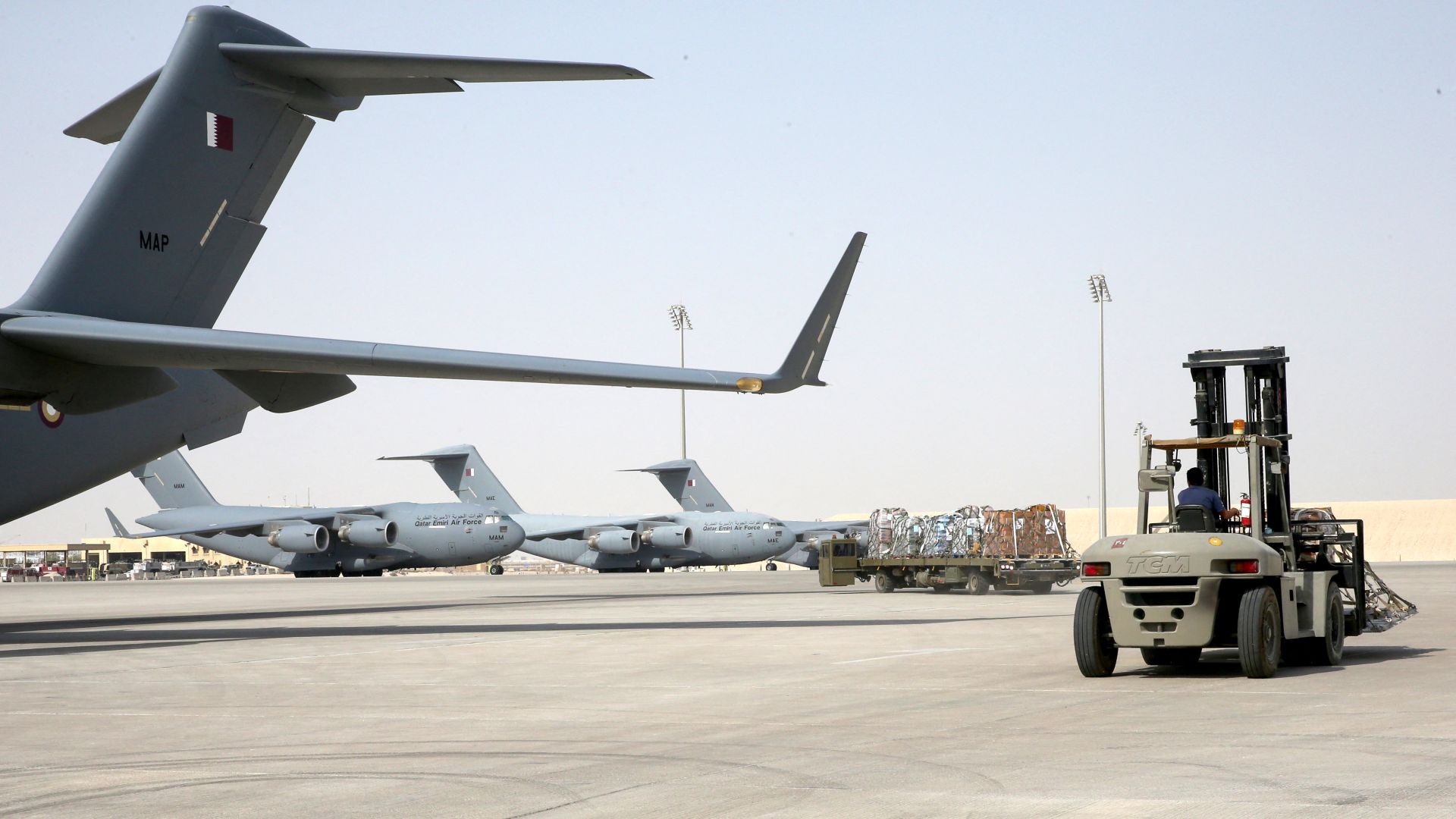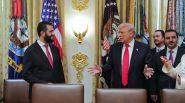- Home
- Middle East
- Iran Attacks US Base in Qatar in Retaliation for Strikes on Nuclear Sites

Relief supplies received from the Qatar Charity to be sent to suvivors of a deadly earthquake in Afghanistan are offloaded from a truck and onto a C-130 aircraft at al-Udeid Air Base in the Qatari capital Doha, on June 25, 2022. ©Mustafa Abumunes / AFP
Iran announced it had launched missiles at a major US base in Qatar on Monday in retaliation for American strikes on key nuclear facilities, with explosions ringing out in Doha and projectiles seen streaking overhead.
Qatar, which lies 190 kilometers (120 miles) south of Iran and is home to the largest US military facility in the Middle East, said its "air defenses successfully intercepted a missile attack targeting Al Udeid Air Base."
Iran's National Security Council confirmed having targeted the base "in response to the US aggressive and insolent action against Iran's nuclear sites and facilities."
In its statement, the council said the number of missiles used "was the same as the number of bombs that the US had used," in a signal that it had calibrated its response to be directly proportional.
After more than a week of Israeli strikes on nuclear and military targets across Iran, the United States joined its ally's campaign on Sunday, carrying out attacks on three key Iranian nuclear facilities, including an underground uranium enrichment facility at Fordow, using massive bunker-busting bombs.
With international concern mounting that Israel's campaign in Iran could lead to regional spillover, concern that only intensified after the US strikes, French President Emmanuel Macron said after the Iranian retaliation that "the spiral of chaos must end."
Iran's security council maintained that its "action does not pose any threat to our friendly and brotherly country, Qatar."
But Qatari foreign ministry spokesman Majed Al-Ansari said his country "reserves the right to respond directly in a manner proportional to the nature and scale of this blatant aggression."
Its much larger neighbor Saudi Arabia, historically a rival of Iran, condemned Tehran's attack "in the strongest terms" and offered "all its capabilities to support the sisterly State of Qatar in any measures it takes."
AFP reporters heard blasts in central Doha and in Lusail, north of the capital, on Monday evening and saw projectiles moving across the night sky.
A US defense official said Al Udeid was "attacked by short-range and medium-range ballistic missiles originating from Iran," adding there were no immediate reports of casualties.
Ansari said the base had been evacuated as a precaution ahead of time.
Iran's Revolutionary Guard Corps said six missiles had hit the base, according to state media.
Iranian official press agency IRNA had reported that missiles were also launched at a US base in Iraq, though the National Security Council made no mention of Iraq in its statement.
Iraqi security and military sources told AFP that Iran had not attacked US bases there "so far."
Earlier in the day, Qatar had announced the temporary closure of its airspace in light of "developments in the region," while foreign embassies there, including that of the United States, had warned their citizens to shelter in place.
Neighboring Bahrain and Kuwait also temporarily halted air traffic in the wake of the missile attack.
President Donald Trump boasted that Sunday's strikes had "obliterated" Iran's nuclear capabilities, but other officials said it was too soon to assess the impact on Iran's atomic program.
Tehran Strikes
Just as Iran was announcing the new attacks, blasts were heard in the north of Tehran, according to an AFP journalist, who reported yellow flashes typical of Iranian air defenses in the sky over the capital shortly before 9:00 pm (1730 GMT).
Earlier in the day, Israel reported carrying out what it said were its most powerful strikes yet on Tehran.
Iran, in turn, fired missile barrages at Israel.
Israeli Defense Minister Israel Katz said the military hit sites in Tehran, including Evin prison, which Katz said "holds political prisoners and regime opponents," as well as command centers for the domestic Basij paramilitary and the Revolutionary Guards.
Iranian media and the Israeli military said Israel also struck Fordow on Monday "in order to obstruct access routes" to the site.
Israel's national electricity company reported "damage near a strategic infrastructure facility" in the south that disrupted the power supply, without naming the location or specifying the cause.
The country's military censorship rules bar the publication of some details about damage in Israel.
Iranian media, meanwhile, said Israel's strikes hit a power supply system in Tehran, triggering temporary outages.
Israeli strikes on Iran have killed more than 400 people, Iran's health ministry has said. Iran's attacks on Israel have killed 24 people, according to official figures.
China urged both Iran and Israel to prevent the conflict from spilling over, warning of potential economic fallout.
US Secretary of State Marco Rubio called on China to help deter Iran from closing the Strait of Hormuz, a chokepoint for one-fifth of the world's oil supply.
Trump Floats 'Regime Change'
After the Pentagon stressed the goal of US intervention was not to topple the Iranian government, Trump openly toyed with the idea.
"If the current Iranian regime is unable to MAKE IRAN GREAT AGAIN, why wouldn't there be a regime change???" Trump posted on his Truth Social platform.
His press secretary, Karoline Leavitt, said on Monday that Trump was "still interested and engaging in" diplomacy.
She suggested, however, that Iranians could overthrow their government if it did not agree to a diplomatic solution.
Top US general Dan Caine has said early assessments indicated the US strikes caused "extremely severe damage" at all three nuclear sites.
Rafael Grossi, director of the International Atomic Energy Agency (IAEA), told an emergency meeting of the UN Security Council that it had not been possible to assess the underground damage at Fordow.
"Armed attacks on nuclear facilities should never take place," he added.
Iran has consistently denied seeking an atomic bomb, and Grossi has said there was no evidence to suggest it was doing so despite the Islamic republic being the only non-nuclear armed state to enrich uranium to 60 percent.
AFP
Read more



Comments